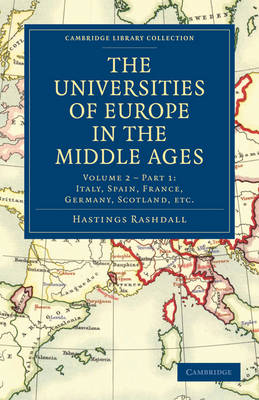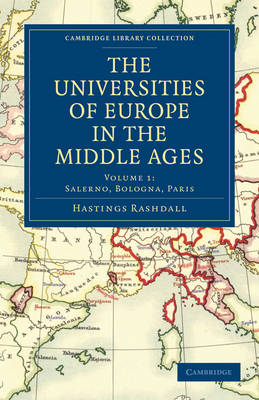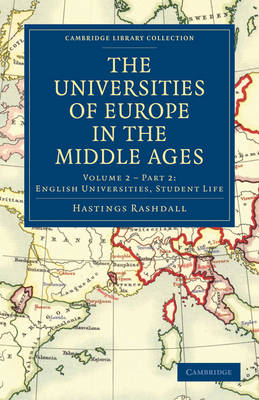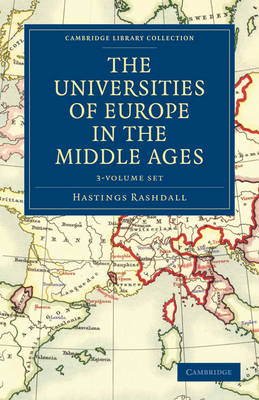Cambridge Library Collection - Medieval History
4 total works
Hastings Rashdall (1858-1924) first published The Universities of Europe in the Middle Ages in 1895. It has remained one of the best-known studies of the great medieval universities for over a century. Volume 2 Part 1 covers the Italian universities from the thirteenth to the fifteenth centuries; the universities of Spain and Portugal from the thirteenth to the sixteenth centuries; the universities of France with detail on the universities of Montpellier, Orleans, Angers, Toulouse and Avignon; the universities of Germany, Bohemia and the Low Countries; the universities of Hungary; and the universities of Scotland. The origins and constitutions, institutional development, and curriculum of each university is analysed. Rashdall's study was one of the first comparative works on the subject. Its scope and breadth has ensured its place as a key work of intellectual history, and an indispensable tool for the study of the educational organisation of the Middle Ages.
The Universities of Europe in the Middle Ages: Volume 1, Salerno, Bologna, Paris
by Hastings Rashdall
Published 2 November 2010
Hastings Rashdall (1858-1924) first published The Universities of Europe in the Middle Ages in 1895. It has remained one of the best-known studies of the great medieval universities for over a century. Volume 1 contains detailed studies of the universities of Salerno, Bologna and Paris with in-depth analysis of their origins and constitutions, institutional development and specialised curriculum. It also includes sections on what a medieval university was; the learning and curriculum of the Dark Ages; the twelfth-century Renaissance; the respective places of Plato and Aristotle in the medieval curriculum; the development of Scholasticism; and the figures of Peter Abelard, Peter the Lombard, and John of Salisbury. Rashdall's study was one of the first comparative works on the subject. Its scope and breadth has ensured its place as a key work of intellectual history, and an indispensable tool for the study of the educational organisation of the Middle Ages.
The Universities of Europe in the Middle Ages: Volume 2, Part 2, English Universities, Student Life
by Hastings Rashdall
Published 2 November 2010
Hastings Rashdall (1858-1924) first published The Universities of Europe in the Middle Ages in 1895. It has remained one of the best-known studies of the great medieval universities for over a century. Volume 2 Part 2 is a study of the medieval universities of England with special focus on the universities of Oxford and Cambridge. Rashdall provides an in-depth analysis of their origins and constitutions, institutional development, curriculum and college systems. There are additional sections on English student life; student numbers and intake; universities' relationships with local towns; relationships with local ecclesiastical structures; and a chapter on the importance of the university of Oxford in medieval thought. Rashdall's study was one of the first comparative works on the subject. Its scope and breadth has ensured its place as a key work of intellectual history, and an indispensable tool for the study of the educational organisation of the Middle Ages.
The Universities of Europe in the Middle Ages 2 Volume Set in 3 Paperback Parts
by Hastings Rashdall
Published 2 November 2010
Hastings Rashdall (1858-1924) first published The Universities of Europe in the Middle Ages in 1895. It has remained one of the best-known studies of the great medieval universities for over a century. Volume 1 covers the archetypal universities of Salerno, Bologna and Paris with detailed analysis of their origins, constitutions, institutional development and specialised curriculum. Volume 2 Part 1 analyses the origins, constitutions and institutional development of medieval universities in Italy, Spain, Portugal, France, Germany, Bohemia, the Low Countries, Hungary and Scotland. Volume 2 Part 2 is a study of England's medieval universities focusing on Oxford and Cambridge, their origins, curriculum, and college systems. Rashdall's study was one of the first comparative works on the subject. Its scope and breadth has ensured its place as a key work of intellectual history, and an indispensable tool for the study of the educational organisation of the Middle Ages.



